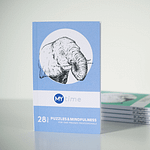… and it’s no walk in the park. If, like me, you’ve been reading the oodles of stats produced around this topic especially since the onslaught of the pandemic, you’ll know something about the toll it’s been taking on people’s mental health and wellness – some even forecasting a far-reaching impact than that of the pandemic itself.
Last week, I had the opportunity to attend Engage Employee’s 2021 Virtual Employee Wellbeing Conference, and found the key note session by Mikaela Elliott, Senior Recruitment Evangelist at Indeed particularly interesting where she talked about her own wellness journey, while also highlighting some of the key findings from the Indeed Mental Health and Wellness in the UK Workplace 2021 Report – featuring exclusive data by YouGov – from actionable insights, to expert advice on this very important topic, including:
- Why workplaces should urgently invest in mental health
- Ways to provide a safe workspace and support staff
- Top tips on wellbeing from The Body Coach, Joe Wicks
- Ways to upgrade focus and wellbeing at work
- How to fight a virus that discriminates
- Ways to advance wellness post-COVID
- Well apps, schemes and services
With reference to remote working experiences:
- 60% of employees reported a positive experience of working from home although 42% cited challenges separating work and personal life.
- Younger respondents indicated experiencing loneliness while older respondents miss their pre-pandemic work routine.
With reference to mental health:
- 59% of employers think employees are comfortable talking about their mental health, while only 45% of employees actually are – further worsening the gap in workplace trust and psychological safety.
- 21% of HR Managers giving less feedback to unsuccessful applicants than before the pandemic as opposed to 14% giving more feedback than before – resulting in poor mental health stemming from the uncertainty and the lack of communication.
Mikaela added that workplaces need to have open conversations and address the elephant in the room in order create greater awareness and understanding, and to come up with the right solutions in tackling mental health – as individuals and as a society for the long-term.
She runs customised wellness and wellbeing workshops; some of the tips from her empathy toolkit include:
- Meeting your most basic needs – focus on small goals. Have a shower, go for a gentle walk, eat something nourishing
- Telling a friend – you don’t have to share everything, but send out a ‘bat signal’ for connection
- Making joy lists – make a list and revisit this list for inspiration and do something off that list that sparks joy
- Moving your body – the connection between the mind and body is real
- Drinking your water – hydration helps
- Practicing gratitude – it really helps to focus your mind on the good things in life, no matter how small
- Journalling – just for you
- Avoiding alcohol or stimulants
- Meditating – use apps like Calm or Headspace if it’s new to you
- Digital detoxing – avoid social apps and news (set an alarm on your phone to go onto ‘do not disturb’ to unwind before bed)
- Engaging your senses – sight, sound, smell, taste and touch
Indeed, the soft stuff is the hard stuff – and the most important stuff.
If you’d like to find out more about the wellbeing workshops, please email Mikaela or get in touch with her on LinkedIn.
To download your copy of the Indeed Mental Health and Wellness in the UK Workplace 2021 Report, click here.
Author: Binu Jacob – EFS Comms Hub Content Lead
Photo credit: Caju Gomes on Unsplash




